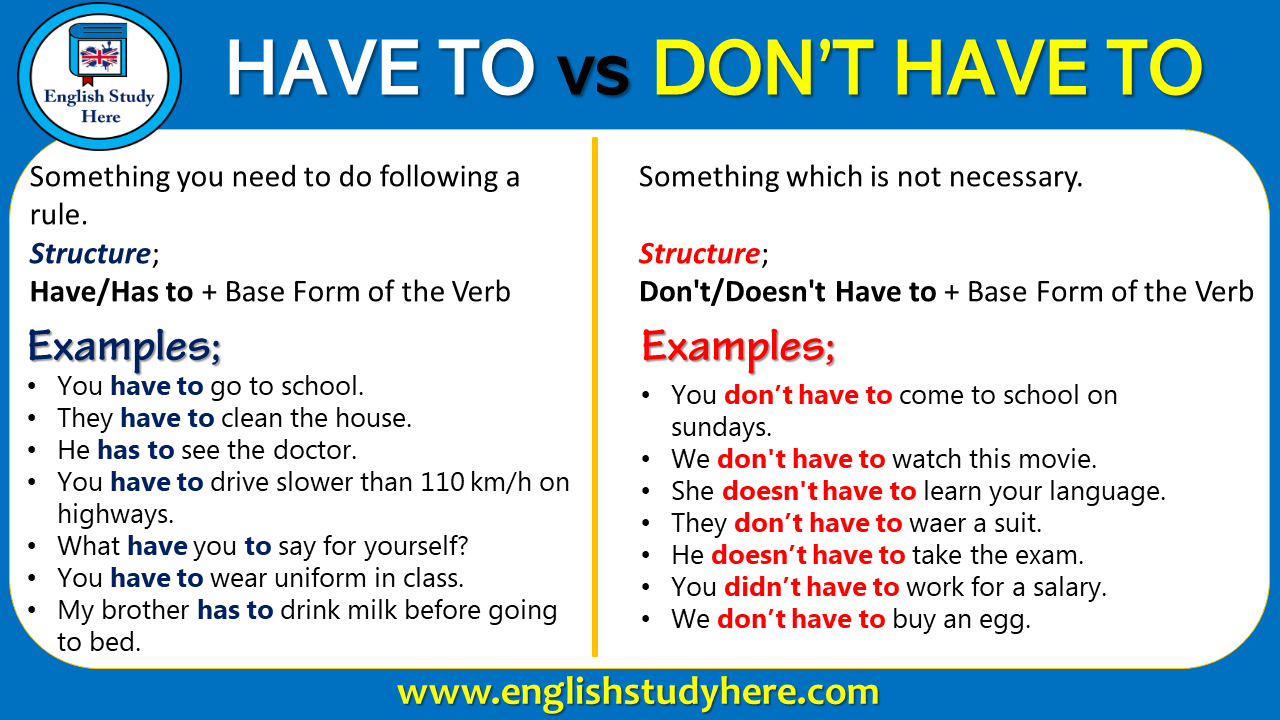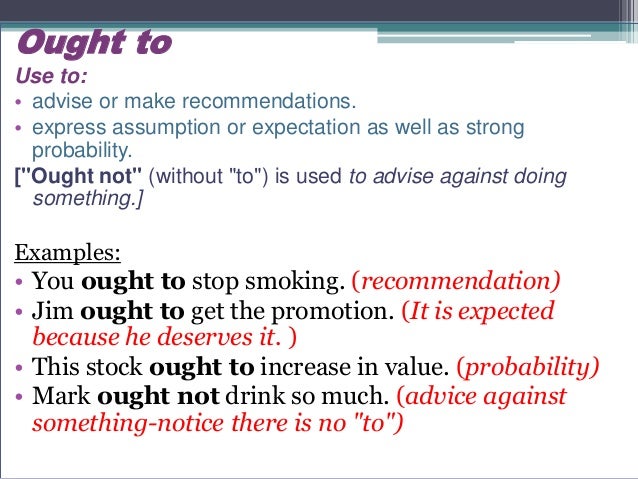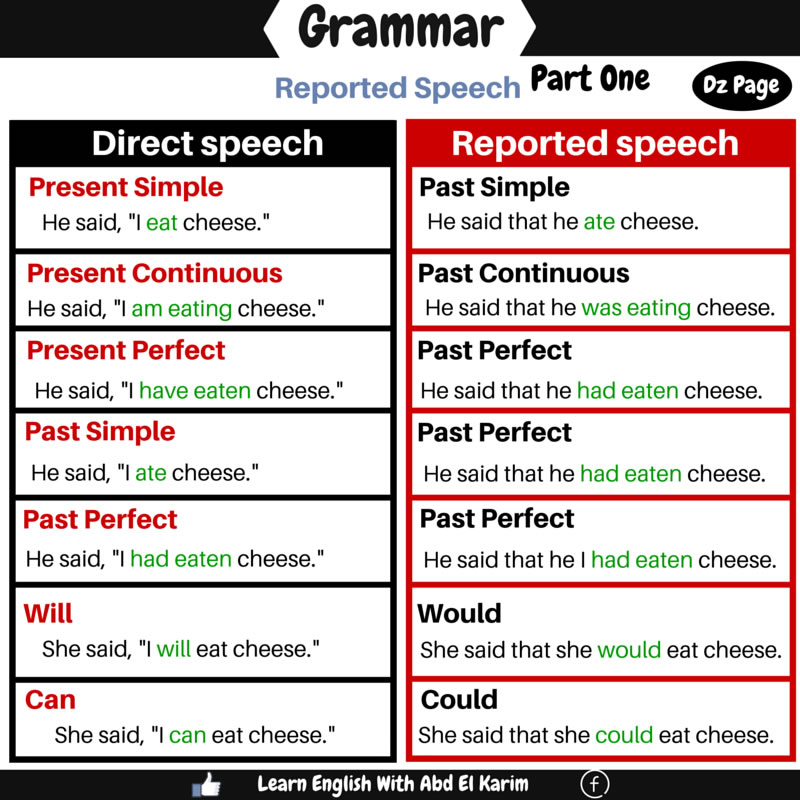3rd WEEK (4th-8thMay)
OVERVIEW & PURPOSE:
To practice:
MODAL VERBS HAVE TO – OUGHT TO.
|
A modal is
a type of auxiliary (helping) verb that is used to express: ability,
possibility, permission or obligation. Modal phrases (or semi-modals) are used
to express the same things as modals, but are a combination of auxiliary verbs
and the preposition to.

Se usa ‘have to’ para expresar obligación o necesidad en
inglés. Su uso es muy frecuente. Abajo están las reglas y unos consejos para
usarlo correctamente. Después hay un ejercicio con las respuestas para
practicarlo.
SE FORMA: con have to + el verbo infinitivo: ver las
diferentes formas abajo




CHECK THESE VIDEOS!!!
HOMEWORK#3
EXERCISE 1
Fill in
the blanks below with HAVE TO or HAST TO, to complete the sentences. Use
the words in the above box.
1. Today is a holiday. I ______________ go to
work.
2. ______________ your sister ______________
go to school today?
3. My mother ______________ go to the post
office now.
4. I ______________ study for the grammar test
tomorrow.
5. A: Do they ______________ get up early
every morning? B: Yes, they __________.
6. Patrick ________________ drive to the
store. He can take a bus.
7. Anne ________________ see a doctor because she
isn’t feeling well.
8. Excuse me, I ________________ answer my
phone.
9. ________________ you ________________ leave
soon?
10. My friend
________________ take a driving test this afternoon.
11. Camels
________________ drink water for a long time.
1. A: I feel cold.
B: You ought
to____________________________________________________________________
2. A: Jack doesn’t like his job.
B: He ought
to_____________________________________________________________________
3. A: Our plane will take off in five minutes.
B: We ought to____________________________________________________________________
4. A: I have a toothache.
B: You ought
to___________________________________________________________________
5. A: Mary has a very noisy neighbor.
B: She ought
to____________________________________________________________________
6. A: Thomas and Patrick want to become rich.
B: They ought to__________________________________________________________________
7. A: I think we’re lost!
B: We ought
to____________________________________________________________________
8. A: I want to improve my English.
B: You ought
to____________________________________________________________________
4th WEEK (11 May – 20 May)
OVERVIEW & PURPOSE:
To learnt REPORTED
SPEECH.
|

REPORTED SPEECH (INDIRECT SPEECH)
¿Qué es el reported speech?
¿Alguna vez has escrito algo que has parafraseado o no mencionas de forma exacta? Si es así, probablemente has utilizado el estilo indirecto, también conocido como reported speech en inglés.
El estilo indirecto o reported speech es la forma en la que puedes contar, explicar, escribir o decir algo con tus propias palabras, cambiando el tiempo verbal al pasado.
Se diferencia del discurso directo de esta forma, ya que el discurso directo implica que digas o escribas todo textual y exacto a como sucedió.
Reglas para utilizar el reported speech
Para usarlo, tienes que tener en consideración algunas reglas sencillas.
Regla N°1: Debes aprender que, en el reported speech, los tiempos verbales cambian.
Es decir, en el direct speech o en el estilo directo, todas las expresiones de tiempos verbales están en presente. Pero cuando utilices el estilo indirecto o reported speech este verbo cambia a pasado. Sin embargo, hay dos excepciones que verás más adelante.
| Estilo directo o Direct Speech | Estilo indirecto o Reported Speech | ||||||||
| Presente Simple Ejemplo: “I am very glad to see you again”, Miguel said. | Pasado Simple Ejemplo: Miguel said that he was glad to see me again. | ||||||||
| Presente Continuo Ejemplo: “Sabrina is working in Buenos Aires” he said. | Pasado Continuo Ejemplo: He said Sabrina was working in Buenos Aires. | ||||||||
| Pasado Simple Ejemplo: “Did you finish the test?” she asked. | Pasado Perfecto Simple Ejemplo: She asked me if I had finished the test. | ||||||||
| Presente Perfecto Simple Ejemplo: Mario said, “I’ve already gone out” | Pasado Perfecto Simple Ejemplo: Mario told me that he’d already gone out. | ||||||||
| Pasado Perfecto Simple Este tiempo verbal se mantiene igual para el direct o reported speech. Ejemplo: “I’d been to my home before the college” she said. She said that she’d been in her home before the college. | |||||||||
Regla N°2: Los tiempos verbales de los verbos modales, también conocidos como modal verbs en inglés, también cambian.
Como hemos mencionado arriba, los tiempos verbales cambian una vez que se pasa del estilo directo al indirecto, y los modal verbs tampoco escapan de esto, excepto would, could, should, might y ought to.
Veamos cómo se aplica esta regla para los verbos modales:
| |||||||||
HOMEWORK#4
Visite los siguientes links y realice las actividades allí presentes, cuando las termine, tome una foto de las mismas y peguelas en un Documento de Word - envíelas al correo o al whatsApp , Nombrando el archivo de la siguiente manera:
nombre_Apellido_9C_Homework4
Example: Diego_Corrales_9C_Homework4
COMMUNICATIVE SKILLS - READING COMPREHENSION
Read the text carefully.
My School
I am Mr.
Morgan. I’m thirty years old and I’m a History teacher at St. Paul’s Secondary School. I live in Pretoria, in
South Africa.
I have a
very busy life. I usually get up at seven o’clock. I prepare my breakfast and
after I go to school by bus. School starts at 8.30.
My school
is very big and old. There are two floors. On the first floor there are ten
classrooms, two Art rooms, two Music rooms, four toilets and the School office
is on the right of the main door. On the second floor there are more ten
classrooms and four toilets. The library is between the Headmaster’s Office and
the Staffroom. The Coffee bar is next to the Computer room. There is also an
Auditorium.
The
Gymnasium is in the second building.
Classes
finish at three o’clock and then I go back home. I have a cup of tea and
prepare my lessons. Sometimes I play football with my friends before dinner. I
always have dinner with my family at 8 o’clock. After I help with the dishes
and watch TV. I always read before I go to bed.
A)
Answer the questions about the text.
1 – Who is Mr. Morgan?
_________________________________________________________
2 - How old is he?
_________________________________________________________
3 - Is he an English teacher?
_________________________________________________________
4 – What time does he get up?
_________________________________________________________
5 – How does he go to school?
_________________________________________________________
6 – Does school start at eight o’clock?
_________________________________________________________
7 – His school is big. How many
floors are there?
_________________________________________________________
8 – How many Art rooms are there?
_________________________________________________________
9 – Are there three Music rooms?
_________________________________________________________
10 – Is there an Auditorium?
_________________________________________________________
11- Where is the Gymnasium?
_________________________________________________________
12- Where is the Staffroom?
_________________________________________________________
13 – Where is the Library?
_________________________________________________________
14 – How often does he read before
he goes to bed?
_________________________________________________________
15 – How often does he have dinner
at seven o’clock?
_________________________________________________________
Taken from: the busy teacher.
COMMUNICATIVE SKILLS 9th C
Write an article of a biography of the origins of your family. APPA Rules on Word office.
nombre_Apellido_9C_myfamily4
Example: Diego_Corrales_9C_myfamily4
Este Blog es de carácter Académico y no comercial, todo el material aquí recopilado pertenece a varios dominios de Internet correctamente referenciados, algunos poseen Creative Common Lincense y otros se les ha respetado los derechos de autor.








thanks teacher for everything, that is very good
ResponderBorrarTo you Mr. and your welcome.
Borrar